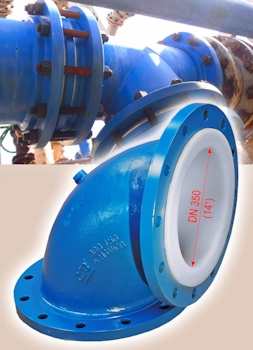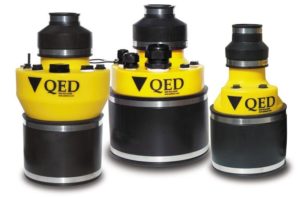New Pipe Fittings from CRP Bring the Benefits of DuPont Teflon PFA
CRP has recently started commercial production of large diameter pipe fittings (up to 14 inches) for the chemical processing industry that are lined in DuPont Teflon PFA fluoropolymer resin.

DuPont/CRP
It uses Teflon PFA because it provides the highest resistance to permeation of all of the fluoropolymers and is the material of choice for the most aggressive conditions.
These new larger-sized fittings from CRP include a 90-degree elbow that is unique in terms of its use of PFA for the lining. CRP uses Teflon PFA as it provides the highest resistance to permeation of all of the fluoropolymers and is the material of choice for the most aggressive conditions. Typical plants demanding large diameter fittings lined in PFA include vinyl chloride monomer plants producing PVC, chlor-alkali process plants and sites producing silicones, elastomers, solvents and chloro-methanes.
Responding to market requirements, CRP has worked to increase the size range of pipe-fittings lined with Teflon PFA from 6 inch (DN150) to 14 inch (DN350) – a four-fold increase in product scale.
“It is no small achievement to create the ability to transfer mould 25 kilogrammes of PFA, to get it to where it needs to be and then cool it, all with the lowest melt flow rate PFA,” explains Michael Bruemmer, sales and marketing director at CRP. “We have found Teflon PFA 350T-J to be the most reliable consistent material for this process, having great thermal stability, resistance to stress cracking and a generally very forgiving character in use. Moreover, with a translucent polymer the results look great and speak for themselves.”
Ivo Erren, sales representative at DuPont Fluoropolymer Solutions, confirms this view: “Teflon PFA 350T-J and Teflon PFA 450HP have become the material of choice for PFA lined products in both corrosive and highly permeating environments. Its almost universal chemical resistance combined with its smooth surface provides excellent cleanability make it a winner in the pharmaceutical industry.”
One of the most challenging parts in the new range from CRP is the 90 degree elbow. In order to manufacture this, CRP has extended its range of investment cast steel castings, creating a one-piece (versus a more usual three-piece) design. This has the advantages of matching the ASME B16.5 dimensions favoured by industry and providing precise geometry for plant build.
PFA also facilitates installation, not only with regard to its one-piece design, but also because PFA moulded flanges do not exhibit the classical memory effect, enabling fittings be taken out of line without worrying about flare faces lifting. Moreover, the superior creep performance of Teflon PFA means that flanges require much less re-tightening to achieve a seal in process. The fittings can withstand the full pressure requirement of ASME B16.5 group 1.1 materials of 14 bar at a maximum temperature of 200°C.
Process pipework used in multi-purpose pharmaceutical plants is often required to convey different materials. The exceptionally smooth surface and low wettability of Teflon PFA assists both cleaning and changeover. Similarly, during high-purity sulphuric and hydrofluoric acid production, the cleanliness of PFA is a key attribute, as Michael Bruemmer confirms: “One of our customers working in the semi-conductor industry measures contamination in terms of parts per trillion – the equivalent of one drop of water in 20 Olympic-sized swimming pools. The ultra high-purity of Teflon PFA can provide confidence in such cases that no contamination of the process media can occur.”
For its customers conveying non-conducting materials such as solvents, CRP has already proven 14 inch sizes using Teflon PFA C-980, the conductive “anti-static” grade of PFA from DuPont. The material’s excellent conductivity allows the discharge of electrostatic charges generated within pipelines.
“Of all of the superior attributes provided by Teflon PFA in these applications, it is perhaps permeation performance that has proven to be the most important,” concludes Michael Bruemmer. “Liner collapse through permeation and inadequate venting can lead to significant plant failures and extended shutdowns – something that none of our customers want. One of our key customers, working with particularly permeant substances, specifies vent bosses with PTFE plugs on all of their PTFE-lined pipe spools in order to manage the permeant liquid through the piping system. This same customer doesn’t bother with the venting system on the adjacent PFA fittings because of their experience of reduced permeation through these fittings. Proof if it was needed.”
Established in 1983, CRP manufacture and supply PTFE and PFA lined piping, PFA lined valves, PTFE bellows, sight glasses and sampling systems for the chemical, pharmaceutical and associated processing industries.
Source: DuPont de Nemours, Inc.


